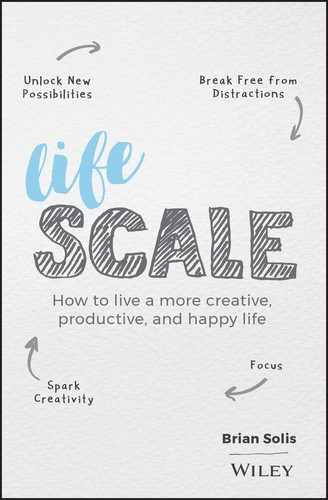Chapter 10
Liberate
Define Success on Your Trms
“Your time is limited, so don't waste it living someone else's life.”
– Steve Jobs
How do you define success? Is it by job title? Income?
Assets? Status?
I wrestled mightily with this question and wondered how I should measure success. A mentor long ago asked me, “If you had a choice, would you want to be rich or famous?” The young me quipped, “Why can't I have both?”
I now realize that she was guiding me to think beyond both, to my own definition of success. Being rich and famous are crude standards of success that society conditions us to believe will make us happy. She understood that chasing them, seeing them as the purpose of one's work, lures us away from true Happiness.
The understanding of success I learned as a child, which was reinforced throughout my growth into adulthood, was based on the goals and standards taught by my parents, grandparents, teachers, managers, and basically, all other authority figures in my life. It focused too much on a familiar formula:
- Go to church.
- Go to college.
- Work hard and make a good living.
- Make friends.
- Get married.
- Buy a house.
- Buy cars.
- Have children.
- Save money for a rainy day and for retirement.
- Be happy.
It's such a generic prescription, which is so ironic. Many of us are also taught, “You can do anything you set your mind to,” encouraged to believe we can achieve almost anything in life. So why has the list of things we should achieve been so preordained by all the generations that came before us?
I've been unlearning this wisdom of the ages in order to redefine what success means to me, this time with intent and the understanding that a more mindful, empathetic, loving, and present life is the foundation of success as a process of living rather than as a plateau of achievement.
A more mindful, empathetic, loving, and present life is the foundation of success as a process of living rather than as a plateau of achievement.
Success and happiness are mutually exclusive if they're not fundamentally entwined. If we elect to sacrifice happiness for the sake of achieving success, thinking we can focus on being happy later, and that our material success will make us happy, we'll be dearly disappointed.
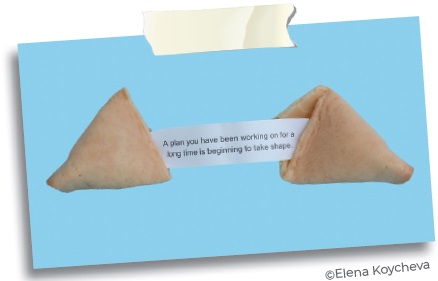
I learned the hard way that success doesn't intrinsically beget happiness. But I also learned that, with mindful attention to what we truly value, our pursuit of happiness can lead to success, which can, in turn, kindle further happiness. They can be powerfully reinforcing, as long as you're defining success on your terms.
Ask yourself right now, How do I define success?
I spent most of my life chasing someone else's definition of success, checking off accomplishments and pursuing material wealth. Looking in the rearview mirror as I surveyed my life, I realized that I measured my success by how confidently I exuded the message, “Look at me! Look what I've achieved.” Maybe that would have made me happy if I hadn't kept raising the bar. But each time I attained a level of achievement I defined as success, it became the new normal, and normal wasn't good enough. I'd find myself pushing for more. The more I had, the more I needed.
It was an exhausting chase because I was seeking satisfaction with my life based on other people's views of me. I was racking up what I thought were trophies of success, which were actually psychological props. I found the most beautiful quotation on the subject. In the words of Nomi Bachar,1
“The effort to overcome one's sense of worthlessness by achieving ‘success' is an entirely defensive mindset birthed from the feeling that one is not ‘good enough.' To compensate for that, one must prove their worth through success and notoriety, ‘prove it' to doubters of the past, but actually one is trying to ‘prove it' to oneself.”
I did feel semblances of happiness along the way, in fact, quite often. But, I didn't feel joy or satisfaction. My work on my values and development of a more mindful focus on the potential of the present moment, day after day, allowed me to see that the semblances of happiness I experienced weren't actually fleeting moments of contentment. They were moments of pride, or I should say vanity. I didn't feel gratitude about my achievements because they didn't matter to me intrinsically; their value rested entirely too much in their social currency.
Meanwhile, all of the stuff I accumulated, mostly so that I could show I had it, started to weigh on me. I learned that with stuff comes pressure to maintain and use it. Otherwise, stuff sits there and becomes a taunting reminder of all the work we've done to get it, and how little time we have to enjoy it. So much of our stuff becomes emotional baggage. Not only does it fail to give us joy, it constantly pulls at our subconscious because we know it is coming at such a cost. We look at it and calculate the opportunity costs in lost family and friend time, lost restorative leisure time, and lost sense of what would actually fulfill us.
Not all of our stuff is burdensome. There's nothing wrong with wanting stuff if we authentically want it, because having it is meaningful to us. Buying an expensive painting is great to do if the work feeds your soul, or you want to foster an artist's career, or assure the painting is well cared for. If you don't stop to look at it sometimes, and feel the meaning to you of its presence, then it has lost its true value.
Some of the stuff we chase reminds us of good times we've had, of steps achieved, of passions we've cherished, like my old guitars. They were good baggage, and I'm so glad I didn't get rid of them because they're now giving me so much joy again. Some of our stuff embodies aspects of who we are.
In order to release yourself from your burdensome baggage, you've got to unpack all of your baggage and take a good look at what you're really carrying around with you.
This is a pivotal moment in lifescaling. We need to decide what we are taking with us, what we need for the journey forward, and what we should leave behind.
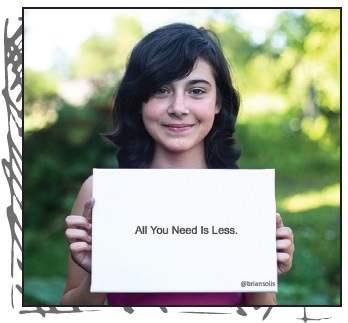
I'll never forget the deep emotional impact of reading a quote by Thich Nhat Hanh,2 Vietnamese Buddhist monk and peace activist, which has stayed with me: “Letting go gives us freedom and freedom is the only condition for happiness.” It was one of those right time, right place messages, and it immediately changed my outlook on stuff. Suddenly, I could see that I was tethered to lots of stuff that was nothing but emotional clutter. It didn't mean anything to me, and I don't think it really impressed anyone else, either.
“Letting go gives us freedom and freedom is the only condition for happiness.”
Learning how to shed the weight of tokens of success is the next step of lifescaling. Here's what to do:
 Step 1: Take an inventory of your baggage and assess it by thinking about why you wanted it, what it meant to you when you got it, and what it means to you now. This goes not only for material possessions, but for all the indicators of your success—the good grades you strived for, the promotions you gunned for and new jobs secured, the trips taken, concerts attended, dinners with friends, and holidays with family. You get the drill.
Step 1: Take an inventory of your baggage and assess it by thinking about why you wanted it, what it meant to you when you got it, and what it means to you now. This goes not only for material possessions, but for all the indicators of your success—the good grades you strived for, the promotions you gunned for and new jobs secured, the trips taken, concerts attended, dinners with friends, and holidays with family. You get the drill.
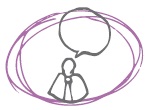 Step 2: Mentally gather up the stuff that's become emotional baggage. Keep in mind as you do this that not all of the emotional weight we feel is negative. Some of it is the product of the healthy pursuit of dreams. For example, if you have an extensive to-do list of ambitious goals, you're probably feeling some guilt or frustration that you're not getting to them quickly enough.
Step 2: Mentally gather up the stuff that's become emotional baggage. Keep in mind as you do this that not all of the emotional weight we feel is negative. Some of it is the product of the healthy pursuit of dreams. For example, if you have an extensive to-do list of ambitious goals, you're probably feeling some guilt or frustration that you're not getting to them quickly enough.
In my case, I have so many things I want to create—a musical album, three different books, several research reports on topics I would love to cover, and a touring pop-up shop for my photography and art. These are all projects that are truly meaningful to me. But I've learned that I need to set some of them aside for a while in order to maintain my creative focus. I just can't get to everything, and taking my desire to start working on all of them with me everywhere was limiting my ability to create any of them.
Other elements of my exhausting baggage were the stuff I thought attested to my success from which I took no true satisfaction. I had to sort through everything carefully, really challenging myself to admit what it meant to me, in order to see which was which clearly.
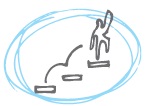 Step 3: Give yourself permission to let go of the things that are holding you back, not only those you don't really want but also your aspirations that are positive and worthy of creation. Plan to revisit them later. Put them away for safekeeping.
Step 3: Give yourself permission to let go of the things that are holding you back, not only those you don't really want but also your aspirations that are positive and worthy of creation. Plan to revisit them later. Put them away for safekeeping.
With those material things you've decided are just weighing on you, think about giving them away. You could take them to Goodwill. Or maybe sell them on eBay. Consider all new purchases you're planning carefully to be honest with yourself about why you want those things. Do you really need the newest iPhone? Could you happily get a few more good years out of your current car?
With your false trappings of success offloaded, you're now free to begin redefining what success means to you.
As I worked on that, by good fortune, I came across a commencement speech by the actor Matthew McConaughey.3 By any measure, he is one of the most successful actors of his generation. What he had to say about success resonated deeply with me, and it resonates with the theme of this chapter.
He presented a challenge to the graduating students:

The question that we've got to ask ourselves is, what success is to us and what success is to you.
Is it more money?
Maybe it's a healthy family.
Maybe it's a happy marriage.
Maybe it's to help others.
Maybe it's to be famous.
. . . to be spiritually sound?
. . . to leave the world a little bit of a better place than you found it.
Continue to ask yourself that question. Your answer may change over time and that's fine. But, do yourself this favor. Whatever your answer is, don't choose anything that will jeopardize your soul. Prioritize who you are and who you want to be, and don't spend time with anything that antagonizes your character.
Be brave. Take the hill. But first, answer that question, what's my hill?
. . .
Be discerning. Choose it because you want it. Choose it because you want to. We're going to make mistakes. You've got to own them. Then you've got to make amends. And then you've got to move on.
You are the author of the book of your life.
We're all on this planet for an undefined amount of time (at least that I know of). While you're here, you can live life according to the standards, expectations, and beliefs of others. You can live mindlessly as you follow worn scripts for success and react to life. Or you can define your own standards of success.
You can live mindlessly as you follow worn scripts for success and react to life. Or you can define your own standards of success.
Let go of the milestones set out for you by earlier generations.
Their life's pursuit, their materialistic possessions, their life status . . . is . . . theirs . . . not yours.
Get comfortable with wanting something different.
You and only you can live your truth (although others will try).
The way to do that with authenticity is to gain clarity about your life's purpose, for this stage of your journey.
Finding life purpose is a profoundly personal, mindful, and soulful process. It requires answering the question, What can I do with my time that is mindful, important, and meaningful, to give the gift of creativity, love, knowledge, peace, and joy to others and myself?
In the chapters ahead, I will lead you through the powerful set of methods I used to answer that question.
Notes
1https://www.gatesofpower.com/single-post/2018/02/15/How-“Hustle”-Culture-is-Ruining-Your-Health
2https://www.goodreads.com/quotes/437734-letting-go-gives-us-freedom-and-freedom-is-the-only
3 https://www.youtube.com/watch?v=BmCTQ_mkzHU
